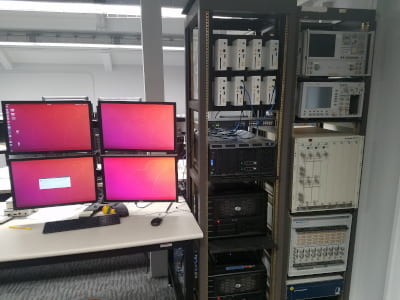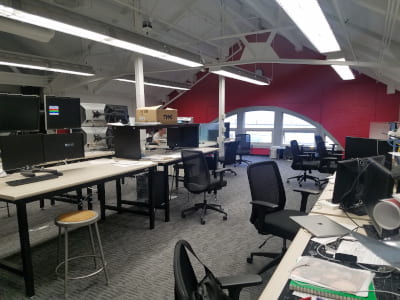At WILab, we not only conduct high-impact fundamental research that helps advance the current state-of-the-art in wireless communications and networking across a range of topics, we also conduct applied research such that we can prototype many of our new ideas and concepts via hardware test-beds and proof-of-concepts to assess feasibility under real-world conditions. Consequently, WILab lives up to WPI’s motto: Lehr und Kunst or Theory and Practice.
Note that we also conduct basic applied research that is more centered around debugging and testing; that type of project work is performed at the Applied Communications Laboratory.
Current Research Activities
The WILab research team is very active exploring a wide range of different wireless topics and applications in order to come up with innovative solutions to difficult technical challenges. Here is a partial list of some of the work we are pursuing at the moment:
5G Communications and Networking
- Devise solutions for spectral co-existence between emerging 5G communications and existing/legacy wireless signals
- Enable practical broadband wireless access to underserved/unserved communities such as rural population centers across the nation
- Explore new wireless backhaul networking architectures using millimeter wave communications
- Design agile transceiver implementations for communication systems to optimize across available resources
- Invent practical approaches for the deployment of Internet-of-Things (IoT) applications
- Identify security vulnerabilities in 5G networks and create countermeasures to protect them from cyber attacks
Connected and Autonomous Vehicles
- Explore new approaches based on insect behavioral models (such as bumblebees) for supporting connectivity between vehicles given limited wireless spectrum (check out our NSF award webpage describing this research in more detail)
- Unify vehicle connectivity with vehicle autonomy to support seamless and safe operation of self-driving cars, trucks, trains, boats, tractors, etc.
- Create a road ecosystem supporting safe travel by providing integrated electronic situational awareness
- Develop new techniques for vehicles to inter-network with each other to enhance situational awareness and provide greater safety on the road
- Implement accurate computer simulation software frameworks that harmonize vehicular connectivity with the physical movement of vehicles on the road
Machine Learning for Wireless Communications
- Create new approaches for collecting electromagnetic emission data from multiple wireless sensor information sources to provide situational awareness of surrounding environment
- Devise machine learning training approaches that enable real-time operation of wireless communication systems in time varying environments
- Invent new cognitive radio techniques that support self-organizing, self-optimizing wireless networks in challenged environments
- Implement predictive algorithms capable of identifying potential disruptions to wireless network operations
- Build machine learning frameworks that are compact, computationally efficient, and converge quickly to a configuration that can be readily used by the wireless device
Satellite and Space Communications
- Invent new algorithms capable of supporting space communications in very challenging operating conditions
- Explore new adaptive wireless systems that can be deployed in space missions via platforms such as cubesats
- Devise new intelligent wireless communication protocols to support lunar and deep space networking
- Enhance global navigation satellite system (GNSS) signals in the presence of other emissions and interference present in the operating environment
Research Facilities


WILab possesses both expert personnel and state-of-the-art facilities for designing and prototyping of wireless communication systems using either computer simulation packages or software-defined radio programmable wireless platforms. WILab is located in a newly renovated, purpose-built, research space in Rooms AK318 and AK320 of the Atwater Kent Laboratories building on the WPI main campus (street address: 125 Salisbury St, Worcester, MA 01609, USA). The research space consists of approximately 1,200 square feet of both graduate student desk space as well as laboratory workbench stations for hands-on research. The workbench stations are all equipped with a variety of wireless testing, measurement, and prototyping hardware. Such equipment can be used to implement a variety of wireless prototypes, including 4G~LTE systems, cognitive radio platforms, and vehicle-to-vehicle networks.

